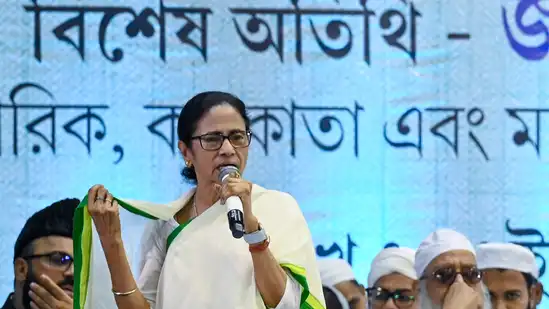“Mamata Banerjee Slams PM Modi, BJP Over Waqf Act: ‘Against Muslims, But in Saudi…’”

Perfect—adding outbound links is crucial for SEO and user trust. Here’s the updated version of the article with contextual outbound links to trusted sources like government sites and news platforms:
Mamata Attacks Modi Waqf Act in Saudi Praise Row
Introduction
As the 2024 Lok Sabha elections heat up, West Bengal Chief Minister Mamata Banerjee has taken direct aim at Prime Minister Narendra Modi and the BJP. At a recent rally, she accused them of hypocrisy—claiming they oppose Indian Muslims while praising Islamic countries like Saudi Arabia.
Banerjee also criticized the BJP’s stance on the Waqf Act, suggesting the party is targeting religious endowments that support the Muslim community. Her remarks sparked debate across political circles and communities, with many seeing her words as both a defense of secularism and a calculated move before the elections.
Mamata’s Key Accusation: ‘You’re Against Muslims, But Praise Saudi Arabia’
PM Modi’s Diplomacy Under Fire
During her speech, Banerjee questioned Modi’s foreign diplomacy:
“You are against Muslims here, but go to Saudi Arabia and praise them. What hypocrisy is this?”
She accused the BJP of targeting Muslims in India while building friendly ties with Gulf nations. Her comments referred to PM Modi’s visits to Middle Eastern countries, where he received honors from Saudi Arabia, the UAE, and others.
🡲 Read more about PM Modi’s Saudi visit on NDTV
Waqf Act Becomes a Focal Point
Banerjee also addressed the BJP’s criticism of the Waqf Act, calling it part of a larger plan to marginalize India’s Muslim community.
“These properties help the poor and serve religious needs. BJP wants to snatch them away.”
She promised that her government in West Bengal would block any central interference in state-managed Waqf boards.
What Is the Waqf Act?
Legal Framework for Muslim Religious Trusts
The Waqf Act of 1995 governs charitable and religious endowments among Indian Muslims. Waqf properties often include mosques, schools, graveyards, and hospitals. These assets are managed by state and central waqf boards.
🡲 Waqf Act details on India Code
India has over 490,000 registered waqf properties, making it one of the largest collections of religious endowments in the world. The Central Waqf Council, under the Ministry of Minority Affairs, oversees them.
🡲 Official website of the Ministry of Minority Affairs
BJP’s Concerns About the Act
BJP leaders have questioned the act’s transparency. They argue that it unfairly benefits one religious group and lacks proper oversight.
Some BJP MPs have called the act “unconstitutional” and demanded its repeal. These statements have alarmed many Muslim organizations and opposition leaders.
Political Reactions to Mamata’s Comments
TMC’s Strategy Before Elections
Mamata Banerjee’s remarks align with her party’s broader goal of protecting Indian Muslims, especially Muslims. In West Bengal, Muslims form nearly 27% of the population, and TMC relies heavily on their support.
TMC leaders defended her comments. MP Derek O’Brien said:
“We are not just defending Waqf. We are defending the secular values of the Constitution.”
Banerjee framed her message around inclusivity and religious freedom, emphasizing that Waqf properties are tools for community welfare, not politics.
BJP Responds Swiftly
The BJP rejected her accusations. Party spokesperson Sambit Patra accused Mamata of playing vote-bank politics and spreading false narratives.
“She’s using religion to hide her governance failures,” he said.
🡲 Sambit Patra’s past statements on NDTV
Other BJP leaders argued that waqf reforms are needed to curb corruption and mismanagement. They also pointed out that all religious trusts, including Hindu temple boards, should be equally accountable.
Muslim Organizations Raise Concerns
Waqf Act Seen as a Community Safeguard
Several Muslim organizations expressed concern over the BJP’s push to repeal the Waqf Act. They see it as an attempt to undermine religious autonomy.
Community leaders stressed that these properties help fund education, housing, and healthcare for many underprivileged Muslims.
“The Waqf system supports thousands of families. Removing it would be an attack on our basic rights,” said social worker Afreen Ansari.
Many legal experts agree that repealing the law without community input would lead to court challenges and unrest.
Double Standards? Praise Abroad, Prejudice at Home
Modi’s Relationship With Gulf Nations
Mamata’s reference to Saudi Arabia aimed to expose a contradiction. While BJP leaders criticize Indian Muslims, they maintain cordial relations with Islamic nations abroad.
PM Modi has received the Order of Zayed from the UAE and was honored by Saudi Arabia. These gestures highlight his strong diplomatic ties with the Islamic world.
🡲 More on the UAE award from The Hindu
Critics argue this is a case of selective respect—embracing Islamic leaders abroad while stigmatizing Muslim communities at home.
Conclusion
Mamata Banerjee’s sharp remarks on the BJP’s alleged double standards have reignited a national debate. Her statement—“You’re against Muslims here, but praise Saudi there”—has drawn both support and criticism.
This issue is no longer just about religious trusts. It reflects deeper questions about India’s secularism, electoral politics, and identity.
As the 2024 elections approach, the battle over the Waqf Act could become a defining flashpoint. For now, voters are left to decide: Is this about reform or religion?






